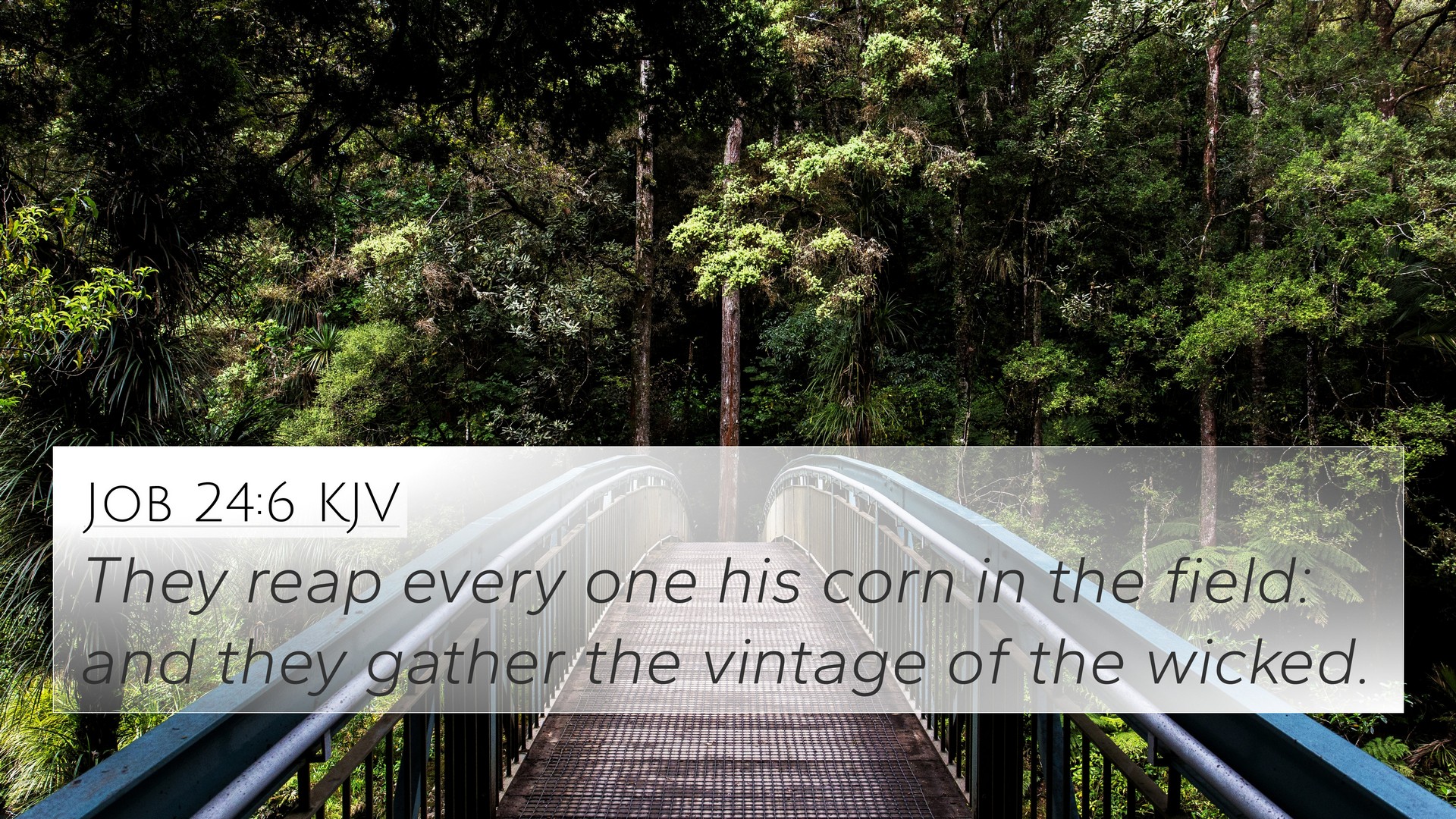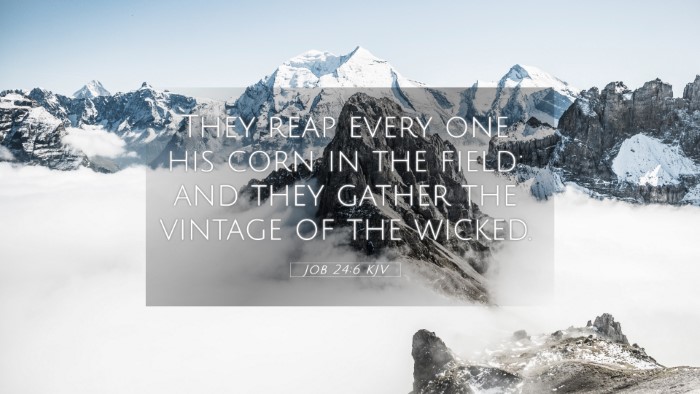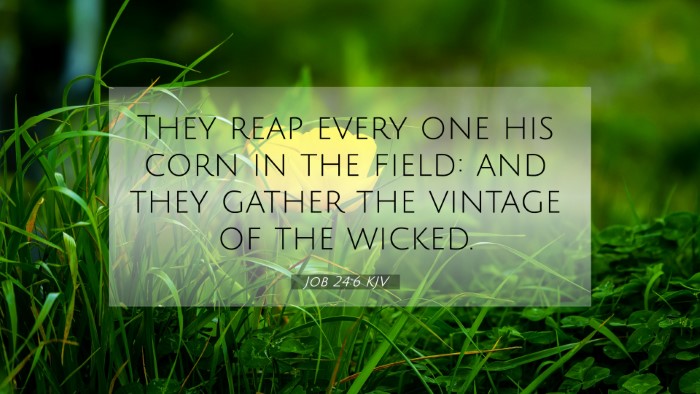Old Testament
Genesis Exodus Leviticus Numbers Deuteronomy Joshua Judges Ruth 1 Samuel 2 Samuel 1 Kings 2 Kings 1 Chronicles 2 Chronicles Ezra Nehemiah Esther Job Psalms Proverbs Ecclesiastes Song of Solomon Isaiah Jeremiah Lamentations Ezekiel Daniel Hosea Joel Amos Obadiah Jonah Micah Nahum Habakkuk Zephaniah Haggai Zechariah MalachiJob 24:6 Similar Verses
Job 24:6 Cross References
They reap every one his corn in the field: and they gather the vintage of the wicked.
Uncover the Rich Themes and Topics of This Bible Verse
Listed below are the Bible themes associated with Job 24:6. We invite you to explore each theme to gain deeper insights into the Scriptures.
Job 24:6 Cross Reference Verses
This section features a detailed cross-reference designed to enrich your understanding of the Scriptures. Below, you will find carefully selected verses that echo the themes and teachings related to Job 24:6 KJV. Click on any image to explore detailed analyses of related Bible verses and uncover deeper theological insights.
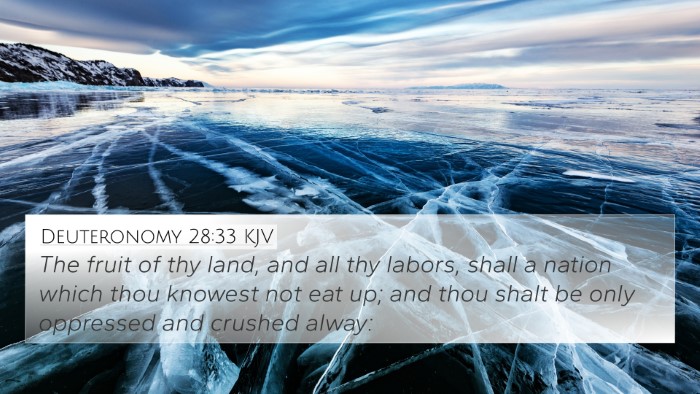
Deuteronomy 28:33 (KJV) »
The fruit of thy land, and all thy labors, shall a nation which thou knowest not eat up; and thou shalt be only oppressed and crushed alway:
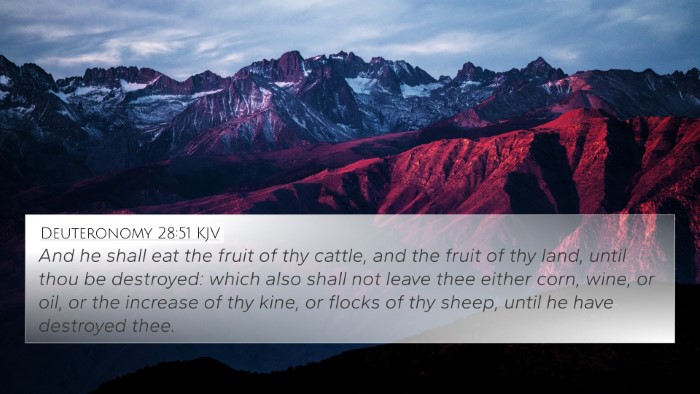
Deuteronomy 28:51 (KJV) »
And he shall eat the fruit of thy cattle, and the fruit of thy land, until thou be destroyed: which also shall not leave thee either corn, wine, or oil, or the increase of thy kine, or flocks of thy sheep, until he have destroyed thee.
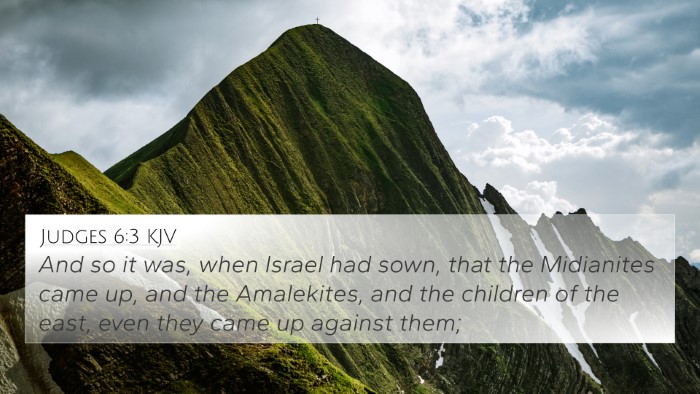
Judges 6:3 (KJV) »
And so it was, when Israel had sown, that the Midianites came up, and the Amalekites, and the children of the east, even they came up against them;

Micah 6:15 (KJV) »
Thou shalt sow, but thou shalt not reap; thou shalt tread the olives, but thou shalt not anoint thee with oil; and sweet wine, but shalt not drink wine.
Job 24:6 Verse Analysis and Similar Verses
Understanding Job 24:6
Job 24:6 states: "They reap every one his corn in the field, and they gather the vintage of the wicked." This verse reflects on the injustices observed in the world, highlighting the plight of the righteous amidst the prosperity of the wicked.
Summary of Commentary Insights
This exploration draws insights from prominent public domain commentaries, including those of Matthew Henry, Albert Barnes, and Adam Clarke. Each commentator offers a unique perspective that enhances the understanding of this profound scripture.
Matthew Henry's Commentary
Matthew Henry emphasizes the stark reality of the existence of evil and the apparent prosperity of the wicked. He notes that the verse illustrates how the wicked harvest from the fields, seemingly unimpeded by divine justice. Henry points out that while the righteous may toil, they often do not reap the benefits of their labor, which raises questions about the moral order of the world.
Albert Barnes' Commentary
Albert Barnes elaborates on the agricultural imagery employed in the verse. He asserts that Job highlights the contrast between the hard work of the righteous and the illicit gains of the wicked. Barnes interprets this as a reflection on human suffering and inequity, underlining the importance of trust in God amidst adversity. He also encourages readers to acknowledge the sovereignty of God in all circumstances.
Adam Clarke's Commentary
Adam Clarke focuses on the ethical implications of this verse. He discusses the moral decay indicated by the actions of the wicked who take advantage of those who work hard. Clarke suggests that this verse serves as a critique of societal norms that allow wrongdoing to flourish, reminding readers of the eventual accountability before God.
Bible Cross References
Job 24:6 can be cross-referenced with several other scriptures that resonate with its themes of injustice, labor, and the fate of the wicked:
- Psalms 73:12-14 - Reflects on the prosperity of the wicked and the struggles of the righteous.
- Proverbs 10:3 - "The Lord does not let the righteous go hungry, but he thwarts the craving of the wicked."
- Ecclesiastes 8:14 - Discusses the vanity of life, where the righteous receive what the wicked deserve.
- Isaiah 3:10-11 - Encouragement for the righteous and woe to the wicked.
- Lamentations 3:34-36 - God does not overlook the oppression of individuals or judgments.
- Psalm 37:1-2 - "Do not fret because of those who are evil or be envious of those who do wrong."
- Romans 2:6 - "God will repay each person according to what they have done."
Thematic Connections
This verse and its thematic connections can be explored through various lenses, such as the struggle of humanity against the backdrop of divine justice. The commentary insights reveal a critical dialogue present in Scripture regarding good, evil, and God’s sovereignty.
Utilizing bible cross-reference guides can help deepen the understanding of how Job 24:6 interrelates with other Biblical texts. It invites readers to engage in deeper Bible study practices, employing tools such as a bible concordance to identify similar themes and compare the teachings of different books.
Tools for Cross-Referencing
For those interested in conducting a comparative Bible verse analysis, various tools can be beneficial:
- Bible Concordance: A vital tool that lists words found in the Bible and their occurrences.
- Cross-reference Bible Study Materials: Documents or apps that provide extensive cross-references.
- Bible Reference Resources: Various compilations and guides for exploring verse connections.
Conclusion
In summary, Job 24:6 encapsulates the tension between the righteous and the wicked in society, prompting critical thought about divine justice. By cross-referencing this verse with others, one can gain a deeper understanding of the interplay between spiritual principles and real-world ethics. Regular engagement in scriptural cross-referencing can lead to enriched faith practices, helping one to navigate the complexities of life's injustices.
